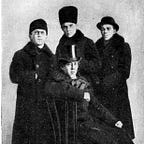On the Knowledge of Utopia
Kind of world I want to live in
Not a cell or a prison or in Hell’s Armageddon
Just a little ghetto where my ni**as control the middle
And know the riddles of life where others know only a little
- Big Pun
Many wonder why my shift in interest to epistemology.
As you well know, at one point I had removed epistemology from the general interest of philosophy thinking it was a topic for neuroscience and biology. Until I asked myself, how did I know that for a fact?
Knowing became much more multidimensional in that instance.
Eventually, it lead to reading about Nobuo Okishio and the general understanding that the main issue with socialism is epistemological.
On the one hand, the limit of knowledge can be physical/biological. Not every person has the same capacity to understand. We vary in our intelligence.
An ideology is dynamic insofar as it can accommodate various levels of intelligence.
On the other hand, the limit of knowledge is political. Not everyone knows everything in a society and no one can ever know.
It becomes a sort of game theory. Who knows what and who can bluff the best factors into the knowledge we put into practice.
Thus Utopia tackles two issues.
It allows everyone to partake in the same ideology and it allows everyone to partake in the world without being taken advantaged of politically.
One’s lack of capacity to understand shouldn’t make them unequal.
One’s lack of political skills should not make them less than.
The question becomes unequal to what? And less than what?
